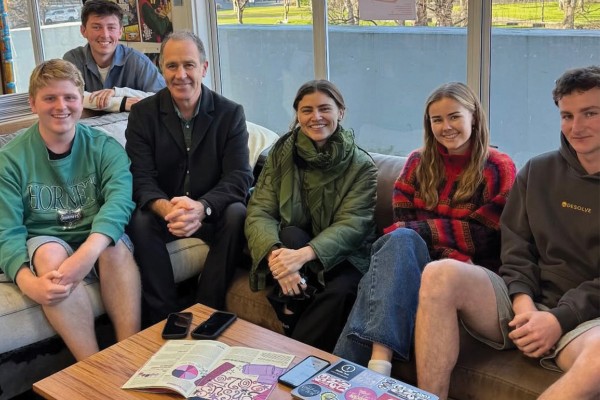Behind the mirage of constant socialisation and great discounts, the reality of student life is that it’s a bit shit sometimes. When Green Party Co-Leader Chlöe Swarbrick was in town for the launch of the Green’s Ōtepoti campaign in the upcoming local body elections, she found a gap in her busy schedule for a yarn on Critic’s couches about what it’s like to be a student in 2025.
Akin to a flat inspection you completely forgot about, the Critic Te Ārohi office was hurriedly stress-cleaned before the arrival of a small army of Green Party staff, including Green MP Scott Willis (spokesperson for Dunedin issues). Once here though, it didn’t take long to delve into the biggest issues facing students – from cost of living to a scarily competitive job market – and what hope the Greens aim to provide in local body elections.
Basic comforts are frequently shafted aside to save money on huge grocery and power bills. Houses are under-insulated, some tenant protections have been rolled back, and students are often taken advantage of by landlords. And once it's all over, many job markets are facing widespread cuts and increasing competition for limited numbers of roles. In the year up to May 2025, 71,200 NZ citizens moved out of the country – with a huge majority going to Australia. Suffice to say, it’s a grim landscape for students.
Having no shame in a cheeky self-promo, Chlöe was given a copy of the recently completed Critic Te Ārohi census to mull over. 84.3% of the 681-student sample was dissatisfied with the current Government. Chlöe wasn’t surprised with Studentville’s distaste with the current coalition, telling Critic, “This government shows its attitude towards regular working people to low income people, to students every single day by punching down.”
Scott Willis, who holds the Green Party energy portfolio, is passionate about warming freezing North D flats. On encounters with people saying things like, “I lived in a cold house once and I was fine,” Scott comments, “We know that in [below] 14 degree temperatures and houses [...] your blood gets thicker. When your blood's thicker, your heart works hard–won't kill you tomorrow, but you'll just have a shorter life.”
These commonly-heard sentiments that being a student invokes nostalgia about suffering – the "bizarre notion” that suffering is a “rite of passage” as a tauira – was a point Chlöe was sure to dispel. “It kind of misses the mark around the point of human progress if we are expecting that everybody successively suffers as opposed to things getting better for the generations that come after us,” explained Chlöe.
Given the somewhat gloomy circumstances, OUSA’s Finance and Strategy Officer Daniel asked Chlöe: “How can students have hope?” Chlöe replied that it’s useful to look at history to see what’s possible. Around every forty years, there’s been economic reform through “militant unionism” – think of the post-Great Depression push for a welfare state through higher taxation on those who’d “profited handsomely during a time of hardship for many.” Then it was neoliberalism in the ‘80s. Chlöe pointed out that we’re now coming to a time where Aotearoa has just about had enough of the inequality we’re facing, and that through collective action, we might just come out the other end with a country that young people want to live in after graduation.
That’s where the Green’s proposed budget comes in, with a fiscal strategy that Newsroom called “radical and they know it”. In students’ wheelhouses (ones riddled with bore-beetles and unresponsive landlords) the Greens also have an answer. Critic had barely finished asking about flatting solutions before Chlöe said, “Okay, three things.” A three-prong package that Green has pushed for a “long time” is a rental warrant of fitness (meaning the onus is on landlords to prove their properties are fit for purpose), a landlord register (so Tenancy Tribunal repeat-offenders might be held accountable), and rent controls (caps on rising rent prices). “The burden continues to fall on disempowered renters, which is again, nonsense,” she said.
For students seeking a tangible way to make a difference, Chlöe and Scott urged the importance of voting for the upcoming local body elections. Local elections affect most aspects of everyday city living: libraries, infrastructure, noise-control, and whether a hypothetical student bar gets an alcohol license. But only if you vote in the Dunedin electorate, not back home. Scott added that given Dunedin currently has a mayor who recently said that we’re not affected by climate change since “the water’s so cold down here,” it would be worth voting for someone who’s not “embarrassing” (ouch).
To round off the interview, Critic asked Chlöe for her unpopular opinion. After a glance at her PR team (“Am I going to get cancelled?”) she replied, “I think that there is a need for the left to look in the mirror and for us to realise that in order for us to win, we have to build those coalitions and that solidarity that I was talking about before [...] Yet for some reason we're not willing to allow people a path back to society for indiscretions on the internet that we may have cancelled them for. I just think that there has to be space for us to practice justice in all forms of our relationships, not only in the abstract.” As one Critic census responder put it, “Bitches hate nuance."







